|
January 29, 2020
Opposition to Criminalization of
Regina Co-op Workers' Struggle
Broad Support for the Just Stand of
Federated Co-operative Workers
in Defence of Their Pensions
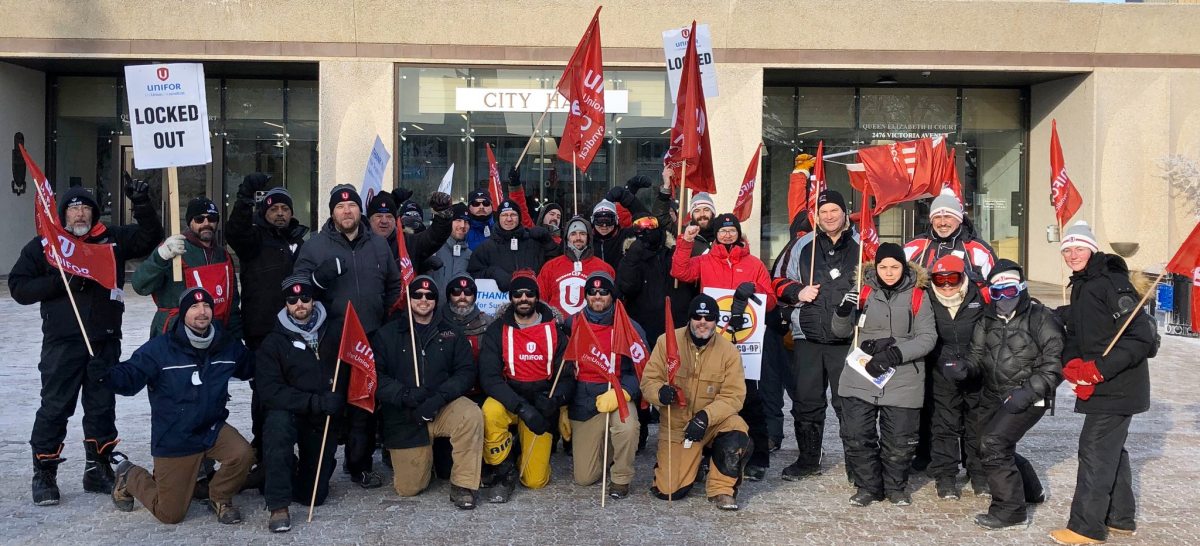
Delegation of Unifor 594 workers from Co-op
Refinery meet with the mayor of Regina to
discuss their just demands, January 24, 2020.
The Fight of Public Sector Workers in
Alberta
• A Resounding No! to
Demands for Massive Rollbacks and Wage Freeze
for Alberta Nurses
• Alberta Public Sector
Workers Continue to Build Resistance to
Kenney's Wrecking Ball - Peggy
Morton
• Ongoing Fight for
Adequate Staffing and Safe Work Places
- Peggy Askin
• Hold Governments
Responsible for Deaths of Women Care Workers!
Not One More Death!
Opposition to Criminalization of
Regina Co-op Workers' Struggle

Canadian president of the International
Longshore and Warehouse Union, Rob Ashton, on
Regina picket line, January 25, 2020.
Workers from many different unions from across
the country have joined the members of Unifor
Local 594 on the picket line at the Federated
Co-operatives Limited (FCL) Refinery in Regina
in the past week. Statements in support of the
workers' bargaining demands and condemning the
police violence against the workers that
occurred on January 20 have come from the
Saskatchewan Federation of Labour, the Canadian
Labour Congress, the International Longshore and
Warehouse Union, the Canadian Union of Public
Employees, the Canadian Federation of Nurses,
the Ontario Public Service Employees Union and
others. The over 800 refinery workers have been
locked out since December 5, two days after the
union served strike notice. The company has been
continuing to operate using replacement workers
and management had been granted an interim
injunction which said that striking workers
could only stop vehicles entering or leaving the
refinery for ten minutes. On January 20 Unifor
members from across the country joined the
picket line to prevent any movement into or out
of the facility. Regina police violently
attacked the picket line and arrested 14 people.
On January 22 Court of Queen's Bench Justice
Timothy Keene found Unifor in contempt of the
injunction and fined the union $100,000.
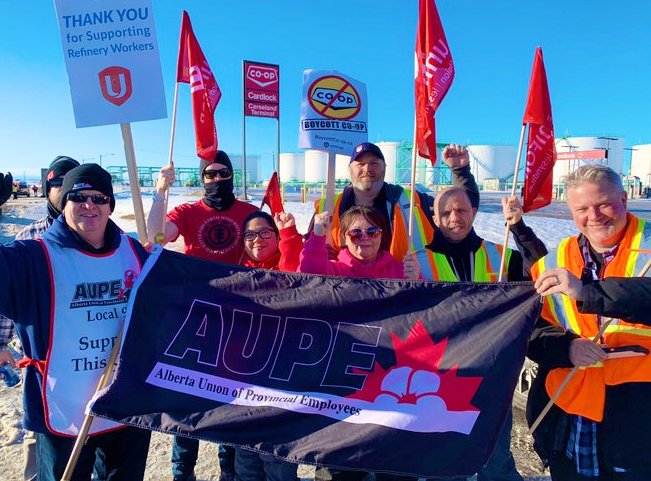 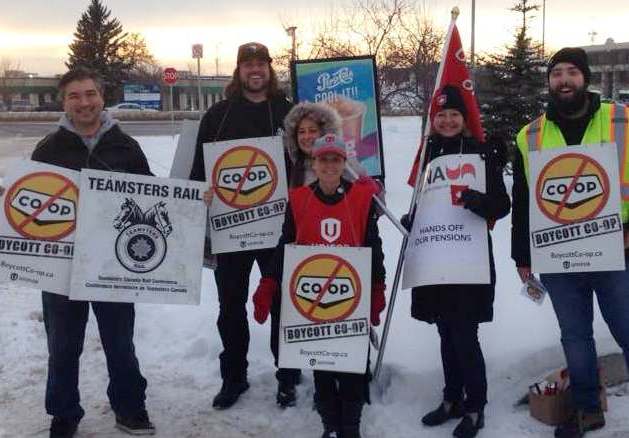
Members of the Alberta Union of Public Employees
(left) and United Nurses of Alberta join Co-op
refinery workers' picket lines.
What is at issue in the determined fight of
the Regina Co-op workers is their longstanding
defined benefit pension plan. The company has
declared that the existing defined benefit
pension plan is not "sustainable" and demands
that the workers make a "choice" between a plan
that significantly increases what the workers
contribute to the plan and/or replaces the
current plan with a defined contribution plan.
In refusing to make this concession the refinery
workers are defending not only their own rights
but the rights of all in the face of a concerted
attack on pensions by employers, both in the
private and public sectors, and on the part of
the federal government in terms of legislation
on workers' pensions when corporations file for
bankruptcy, and the Canada Pension Plan.
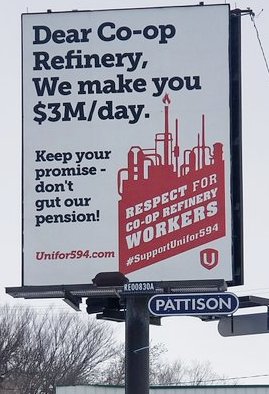 In a modern
Canada pensions are a right that belongs to
workers by virtue of their contributions to the
economy. In fact, all Canadians have a right to
pensions which provide security in
retirement by
virtue of being human. In a modern socialized
economy government has a social responsibility
to guarantee pensions for all. As part of the
anti-social offensive employers and government
are attacking workers' rights not only to
adequate pensions, but also to maintain their
already negotiated working conditions, including
pensions. Employers do so on the grounds that in
order to be competitive they must deprive the
working class of even more of the value that its
labour produces, and governments on the basis
that it is the claims of the rich and not the
people that it must satisfy. In recent years the
pensions of many workers, including municipal
workers in Labrador, Quebec City, Saskatoon, and
industrial workers in many sectors, have come
under attack and the working class is well aware
that it is the right of all to security in
retirement that is under attack. The fight of
the Regina Co-op workers to defend their
pensions is a fight for pensions for all. In a modern
Canada pensions are a right that belongs to
workers by virtue of their contributions to the
economy. In fact, all Canadians have a right to
pensions which provide security in
retirement by
virtue of being human. In a modern socialized
economy government has a social responsibility
to guarantee pensions for all. As part of the
anti-social offensive employers and government
are attacking workers' rights not only to
adequate pensions, but also to maintain their
already negotiated working conditions, including
pensions. Employers do so on the grounds that in
order to be competitive they must deprive the
working class of even more of the value that its
labour produces, and governments on the basis
that it is the claims of the rich and not the
people that it must satisfy. In recent years the
pensions of many workers, including municipal
workers in Labrador, Quebec City, Saskatoon, and
industrial workers in many sectors, have come
under attack and the working class is well aware
that it is the right of all to security in
retirement that is under attack. The fight of
the Regina Co-op workers to defend their
pensions is a fight for pensions for all.
On January 24 striking workers and their
supporters set up a secondary picket at the FCL
fuel terminal in Carseland, Alberta, stopping
fuel trucks from entering and exiting with fuel
destined for Co-op gas bars in Alberta and
British Columbia. The workers are demanding that
FCL return to the bargaining table and negotiate
a collective agreement that is acceptable to
them and which cannot contain the destruction of
the already agreed to pension plan. The company
has said that it will not return to the
bargaining table as long as the union is
"breaking the law" and preventing movement into
and out of the refinery to which the union has
responded that it will take down the barricades
when the company stops using scabs to keep the
refinery operating.
 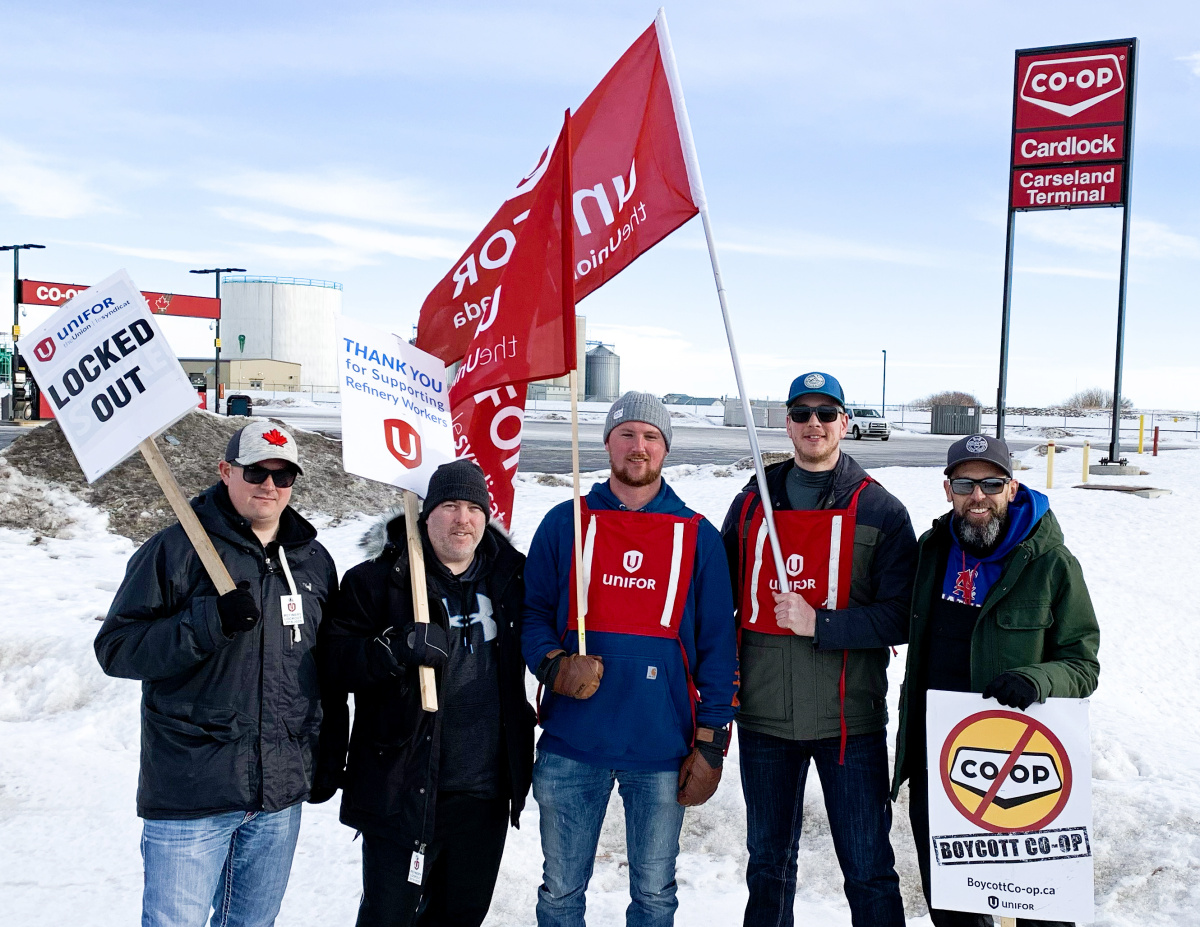
Workers from different sectors and regions join
Co-op refinery workers in secondary picketing at
Co-op Refinery location in Carseland, photos
from January 24, 2020.
The company is relying on the court injunction
and police violence to portray the striking
workers as criminals to confuse public opinion
and diminish support for the workers. It is also
trying to split the working class, saying that
because an increasing number of workers in
Canada have been forced to accept pensions that
are inferior to those of the refinery workers,
the refinery workers should be "fair" and agree
to an inferior plan. In response, the mass
mobilization of workers from all sectors to
stand with the Co-op workers is the expression
of the unity of the working class in action in
defence of workers' pensions and the rights of
all to security in retirement.


The Fight of Public Sector
Workers in Alberta

Rally at University of Alberta hospital, January
25, 2020.
United Nurses of Alberta (UNA) reports that
negotiations began for a new Provincial
Collective Agreement between themselves and
Alberta Health Services (AHS) on January 15. The
AHS quickly tabled a host of "proposals"
attacking nurses' wages and conditions of work.
The AHS is demanding a four-year wage freeze for
nurses, who have not received an increase since
2016. UNA's opening proposal called for 2 per
cent pay increases in each of two years.
 Instead of
ending hiring freezes, filling vacant positions,
and ensuring adequate staffing to guarantee the
well-being of both patients and staff, the AHS
wants to eliminate designated days of rest for
part-time employees, be able to force part-time
employees to work up to full-time hours, cut
overtime rates, and move nurses around to
multiple work sites as they please. Other
proposals include eliminating premiums for
employees with bachelor's, master's or doctoral
degrees, slashing evening, night and weekend
premiums, and slowing advancement of employees
up the salary grid, which now takes nine years
to achieve the maximum pay grade. Instead of
ending hiring freezes, filling vacant positions,
and ensuring adequate staffing to guarantee the
well-being of both patients and staff, the AHS
wants to eliminate designated days of rest for
part-time employees, be able to force part-time
employees to work up to full-time hours, cut
overtime rates, and move nurses around to
multiple work sites as they please. Other
proposals include eliminating premiums for
employees with bachelor's, master's or doctoral
degrees, slashing evening, night and weekend
premiums, and slowing advancement of employees
up the salary grid, which now takes nine years
to achieve the maximum pay grade.
The Kenney government has concocted something
called the "the Ontario-West Standard," intended
to divert people from the issue which is the
government's wrecking, by claiming that Alberta
is "spending too much" on health care compared
to other provinces. The aim is to divert from
the claims which people are laying for their
right to health care, and the right of the
workers who provide that care to wages and
working conditions commensurate with their work
and contribution to society. Although the AHS is
at the table the Kenney government is
controlling every move, not only of AHS but
every employer in the province who receives any
level of public funding, and has even made it
illegal for an employer to divulge the
instructions it has received from the
government.
These outrageous demands by the UCP government
are accompanied by threats of massive job losses
through privatization, and cuts to nursing jobs
across the province.
Nurses and other health care workers are
upholding their social responsibility when they
refuse to submit to this anti-social offensive
and use of arbitrary powers and dictate in place
of negotiations. The Canadian Nurses Association
points out that, "Global evidence links lower
nurse staffing and skill mix to adverse patient
outcomes such as increased mortality, falls,
infections and longer lengths of stay." The
anti-social offensive of the Kenney government,
if successful, would worsen already
unsustainable working conditions, and degrade
patient care.
As for "saving money" the intent of the Kenney
government is clear. As a government of the
financial oligarchy, its aim is not to provide
for the needs of the people of Alberta, but to
maximize the profits of the financial oligarchy.
This is why it has announced that it will
introduce more health care based on the motive
of private profit. In this way the wealth
created by the working people and claimed by
government is handed over to the rich. Also,
funding withdrawn from health care goes to pay
the rich.
UNA President Heather Smith gave a fitting
response. "The last time the employer proposed
rollbacks of this magnitude was in 1988, and we
all know what happened after that," she said.
Smith was referring to the last province-wide
strike of Alberta nurses which took place in
1988.[1]
One of the defining features of the 1988 strike
was the determination to uphold the principle
that nurses had a right to decide what wages and
working conditions were acceptable to them, a
stand which won massive public support.
Note
1. In 1988, more than
14,000 nurses at 98 hospitals across Alberta
went out on strike. The Alberta government had
made strikes in public health care facilities
illegal following the 1982 nurses' strike. For
nineteen days nurses stood as one to say No! to
rollbacks and concessions. The government
launched attack after attack to break their
resistance. Holding a strike vote was declared
an illegal act, UNA was charged with "criminal
contempt of court," and threatened with $1
million in fines, seizure of the union's assets,
and an end to dues collection. Individual nurses
were served with civil contempt of court
charges, fines, and threats of termination. In
the end UNA was forced to pay $424,000 in fines,
which it did through the support of the union
movement. But nurses stood firm, and when they
returned to work after 19 days their collective
agreement remained intact.

Rally during Alberta nurses strike which began
January 25, 1988.

- Peggy Morton -
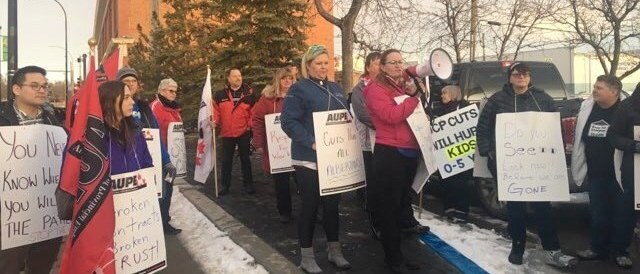
Alberta nurses noon-hour rally in
Claresholm, January 21, 2020.
Noon-hour rallies were held in Edmonton,
Lethbridge and Claresholm during the week of
January 20, where health care and other public
sector workers were joined by workers from other
unions and members of their community. They
spoke out against the government's threats to
privatize large sectors of public services, and
demanded that the government improve, not wreck,
health care and other public services. They also
expressed their resounding No! to
attacks on their wages and working conditions.
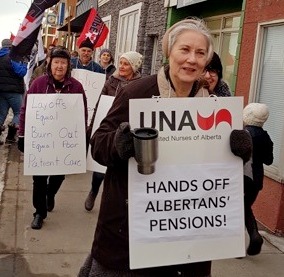 The UCP
government has said it will reduce the number of
workers in the public sector by more than seven
per cent by 2023. In late November, the
government sent letters to the unions
representing public sector workers saying that
it is looking at contracting out a wide swath of
public services, from ambulance services and
public medical labs to hospital housekeeping and
laundry services, medical transcription, home
care nursing, and jobs in social and community
services. This would be a potential loss of
6,400 to 7,400 unionized public-sector jobs by
2023, including between 3,900 and 4,900 in
health care. The UCP
government has said it will reduce the number of
workers in the public sector by more than seven
per cent by 2023. In late November, the
government sent letters to the unions
representing public sector workers saying that
it is looking at contracting out a wide swath of
public services, from ambulance services and
public medical labs to hospital housekeeping and
laundry services, medical transcription, home
care nursing, and jobs in social and community
services. This would be a potential loss of
6,400 to 7,400 unionized public-sector jobs by
2023, including between 3,900 and 4,900 in
health care.
In a recent interview with CTV Edmonton,
Kenney stated, "Nobody is being laid off now,
let's be clear about that. These are prospective
reductions in employment levels over four years
if we can't find other savings."
The intent of such statements seems clear.
Kenney is suggesting that privatization is a
form of "saving money" and that if the workers
submit to the intensified assault on their wages
and working conditions, thus "saving money," he
might spare public services from his
privatization wrecking ball.
The working people of Alberta have been down
this road before, and learned through bitter
experience that it is fraud and blackmail from
start to finish. The workers are pointing out
that the government is serving big business with
its threats to privatize. Privatization has
nothing to do with "saving money" and it never
did. It is a way of transferring more of the
wealth created by the workers and claimed by
governments into the hands of rich private
interests. Privatization of public services
carried out during the Klein years actually
reduced government revenues, as the added-value
created by workers was handed over to private
interests (for example registry offices and
liquor stores). The Klein government then used
falling revenues as a pretext to step up the
assault on public services and the workers who
deliver them.
Through their pickets, the workers are taking
the lead to unite their own ranks and to develop
public opinion for a pro-social program
which defends the rights of all. In opposition
to the aim of maximum profit for the financial
oligarchy, a new direction for the economy to
serve the needs of the people is needed. Workers'
Forum calls on the working people to
discuss with their peers what is at stake, and
to join the pickets and rallies in their
communities.
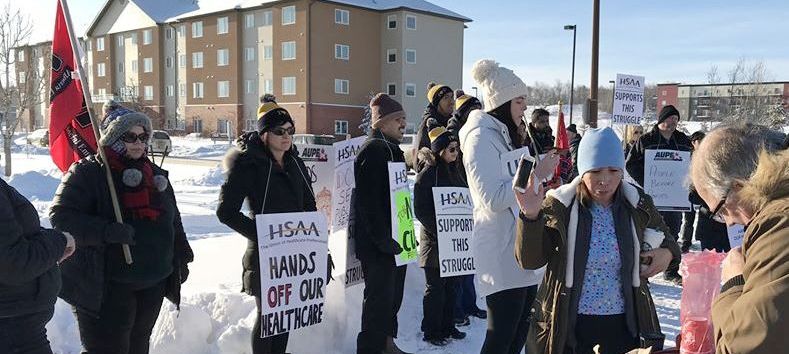
Health care workers picket in the Peace River
region against cuts, January 22, 2020.

- Peggy Askin -
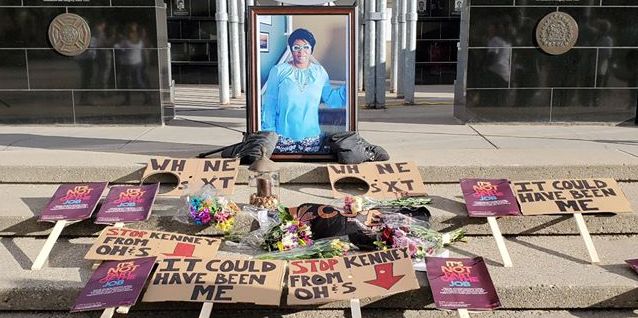
Rally at Calgary City Hall, November 17, 2019,
demands justice for Debbie Onwu who was killed
on the job in October 2019.
Care workers in Alberta have carried out a
protracted fight for safe working conditions, in
the face of the indifference of successive
governments. Since the early 2000s four women
care workers have suffered violent deaths in
their workplaces in Alberta. Most recently,
Debbie Onwu lost her life on October 25, 2019
while working in a group home for youth with
mental health problems operated by Wood's Homes.
After Debbie's tragic death, youth
care-workers, former youth-care workers, and
their union began organizing to demand justice
for Debbie and to prevent future tragedies. On
November 17 2019, friends, family, and
co-workers from CUPE Local 4731, together with
workers from other CUPE locals and unions
rallied at Calgary City Hall to demand justice
for Debbie Onwu. All the speakers and everyone
at the rally demanded that the government take
action to provide the needed supports for care
workers to ensure their safety in the workplace.
They also demanded appropriate facilities for
both youth and adults with complex care needs.
"Please do not ignore us. The abuse of staff
within various agencies needs to stop now
because our lives matter and we will no longer
tolerate the bullying and the abuse," said
Rebecca Opoku, a social worker and friend of
Onwu. Friends at the rally asked those in
attendance to reach out to their MLAs to bring
the issue to the surface. "Debbie doesn't have a
voice anymore, but we do," Opoku said. "It's not
OK for us to die in our line of work."
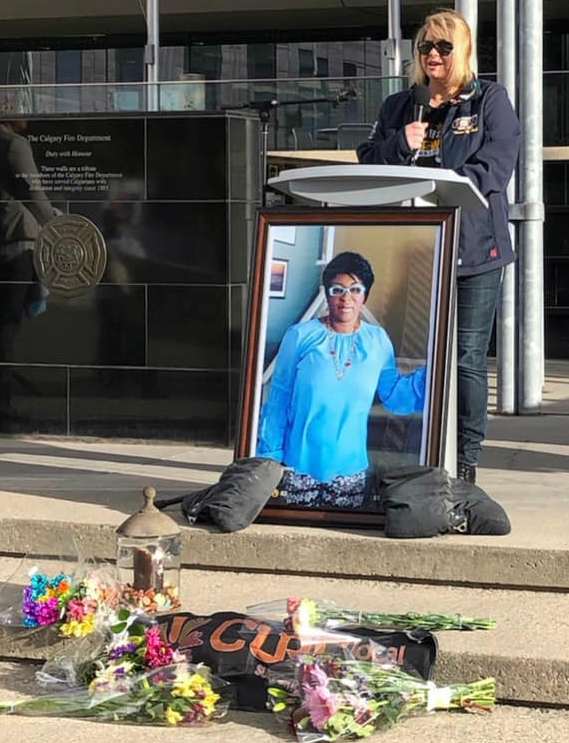 Ivana Niblett,
United Steelworkers representative also
addressed the rally. "Our efforts today, in
solidarity and in Debbie Onwu's name, are to
increase safety standards and regulations for
all employees who may be potentially at risk,
especially those working with high risk
populations in a variety of roles," she said.
"No one should ever have to go to work and
wonder if they will arrive home safely to their
loved ones at the end of the day. Let's get
justice for Debbie!" Ivana Niblett,
United Steelworkers representative also
addressed the rally. "Our efforts today, in
solidarity and in Debbie Onwu's name, are to
increase safety standards and regulations for
all employees who may be potentially at risk,
especially those working with high risk
populations in a variety of roles," she said.
"No one should ever have to go to work and
wonder if they will arrive home safely to their
loved ones at the end of the day. Let's get
justice for Debbie!"
A spokesperson for CUPE Alberta explained that
part of the problem is the lack of support for
vulnerable youth who are in care. "In our
society, they don't want to focus on vulnerable
people and we don't want to focus on people who
need the most intensive kind of help," said Rory
Gill, the president of CUPE Alberta.
Debbie Onwu was working the night shift when
she died, and was alone with a severely mentally
disabled man who is charged with her murder. The
Canadian Union of Public Employees, who
represents the workers at Wood's Homes, reports
that the man was classified as requiring at
least a 2-1 ratio of care, had complex mental
health needs and a history of violence. At the
time of her death, her co-worker had been called
to another floor. Lou Arab, communications
representative for CUPE Alberta Division, told
media that the union had been raising concerns
about staffing levels and safety issues for
years. He said funding and the work environment
need improvements.
Debbie was the fourth woman care worker to be
killed while at work in Alberta since the early
2000's. Sharla Collier, a 20-year-old care
worker from Lethbridge, was sexually assaulted
and killed by a youth in her care in 2002.
Camrose care worker Valerie Wolski, 41, was
killed by a youth in her care in 2011. Another
Camrose care worker, Dianne McClements, 61, was
killed in 2012 by a youth in her care while
working in a home run by Camrose Community
Connections. In all these tragic deaths, like
Debbie Onwu, the women were alone when they were
killed.
Erin Northey, a former youth caseworker who
has launched a petition demanding action from
the province, said she knows first-hand the
dangers of working with vulnerable populations.
While working in a high-risk environment in
2016, she was assaulted by a client and suffered
a concussion, resulting in post-concussion
syndrome, anxiety and PTSD. She counts herself
lucky that she made it out with her life.
"It's time for change," said Northey. "We're
demanding action." The petition "Demanding
Action for Increased Safety of Individuals
Working in High Risk Environments" now has close
to 14,000 signatures. It can be found here.
Northey emphasizes front-line workers know what
changes are needed, and governments need to
listen to them. Everything from funding,
legislation and resources for employees
transitioning back into the sector should be
evaluated, she said.
It is unconscionable that care workers, social
workers and all the dedicated and skilled
workers in this challenging field are not
provided with the resources and safe working
conditions that they need to perform their work.
The workers and professionals in this field are
invaluable to society and vital to the healing
and well-being of those they care for. They know
what is needed and they have the right to
working conditions which they decide will
provide a safe environment so that they do not
face injury and death in their workplaces.
Nothing less is acceptable.

Two public inquiries have taken place in
Alberta into the deaths of women care workers at
their workplaces. They reveal the utter refusal
by governments to provide what is needed to
ensure the safety of women providing care for
youth and adults with complex needs, and the
well-being of those they care for. At the heart
of the matter is the escalating anti-social
offensive and determination to slash funding for
social programs including the care of the
severely developmentally disabled, and those
with mental illnesses.
 Group homes have
become the model for youth in care, irrespective
of whether it is suitable or beneficial to them
or whether care can be provided safely. Group
homes may be run by community-based
organizations on a "not-for-private-profit"
basis or by companies established with the
motive of private profit. Most care workers are
women, and the public inquiries were told that
it is too difficult to recruit men for such low
wages. These women look after vulnerable youth,
and severely developmentally disabled adults,
often alone and without back-up. The families
and loved ones of the women who died all spoke
of their dedication to their job and concern for
the youth or young adults they cared for. Group homes have
become the model for youth in care, irrespective
of whether it is suitable or beneficial to them
or whether care can be provided safely. Group
homes may be run by community-based
organizations on a "not-for-private-profit"
basis or by companies established with the
motive of private profit. Most care workers are
women, and the public inquiries were told that
it is too difficult to recruit men for such low
wages. These women look after vulnerable youth,
and severely developmentally disabled adults,
often alone and without back-up. The families
and loved ones of the women who died all spoke
of their dedication to their job and concern for
the youth or young adults they cared for.
The small numbers of residents and staff in
each home and large number of agencies and
organizations involved make it difficult for
staff to organize, and render the residents and
staff less "visible." Most of the staff are
unorganized and many are paid poverty-level
wages, with staff shortages and lack of
resources the norm. This model also makes it
more difficult for families to advocate, as they
did so successfully in forcing the Alberta
government to back down and keep the Michener
Centre open. The province has contracted out
care as a means to divest itself of
responsibility to provide safe working
conditions and the conditions those in care
require.
Findings of the Public Inquiries into Deaths
of Care Workers
In 2002, Sharla Marie Collier, age 20, was
sexually assaulted and killed by a youth in her
care while they were alone. A Public Fatality
Inquiry into Collier's death was held in 2007
and a report issued in 2008, six years after her
death. In his report, Justice Lloyd P. Malin
recommended that care workers should only be
assigned to the care of a resident that the care
worker can physically manage. He also stressed
that all records about a resident must be
available to care workers, and that specific
training be provided about the conditions of
residents under their care. He noted that the
province's Occupational Health and
Safety regulations on working alone did not
address the situation of care workers working
with potentially violent persons. Eighteen years
after the death of Sharla, this is still the
case.
Youth care worker Valerie Wolski was killed in
2011. Six years later, in 2017, the report of
the Public Fatality Inquiry into her death,
written by Judge Bart Rosborough, was released.
In the intervening period, another care worker,
Diane McClement, 61, had been killed in 2012
while working in a home run by Camrose Community
Connections. A youth in her care was charged
with her murder. No public inquiry was called.
At the time, Occupational Health and Safety
would not even confirm if it was conducting an
investigation. The government never issued a
public report regarding her death.
 When the report
of the inquiry into Wolski's death was finally
released, the culpability of the government was
staggering. Wolski had agreed to take on the
care of a young man who was profoundly
developmentally disabled at a home under the
management of the Canadian Mental Health
Association (CMHA). Neither Wolski or the CMHA
were informed that he had a history of violent
behaviour, particularly towards women care
workers, or provided an accurate history or
assessment of his care needs. In fact they were
provided completely misleading information, such
as that the young man was a "teddy bear."
Indeed, staff from the CMHC stated they would
not have taken on his care if they had been
aware of the history of violence, as they were
not equipped to do so. When the report
of the inquiry into Wolski's death was finally
released, the culpability of the government was
staggering. Wolski had agreed to take on the
care of a young man who was profoundly
developmentally disabled at a home under the
management of the Canadian Mental Health
Association (CMHA). Neither Wolski or the CMHA
were informed that he had a history of violent
behaviour, particularly towards women care
workers, or provided an accurate history or
assessment of his care needs. In fact they were
provided completely misleading information, such
as that the young man was a "teddy bear."
Indeed, staff from the CMHC stated they would
not have taken on his care if they had been
aware of the history of violence, as they were
not equipped to do so.
Justice Rosborough referenced the Collier
Report and repeated its recommendations. He
wrote that "it would appear obvious that a
diminutive Individual Supports Worker such as
Wolski ought not to have been assigned
responsibility for the care of a young and very
large man" (who was 6'5" and between 250-300
pounds), particularly when a history of violent
acts existed. The report repeated the
recommendations of the Collier Report, and
further that female care workers should not be
assigned the exclusive care of residents who
have previously expressed or demonstrated
aggression toward females.
The Report further noted that the underlying
theme permeating the inquiry was that the
government had no facilities suitable for the
care of developmentally disabled persons with
complex needs. Many people who testified spoke
about this failure of the government, and noted
the government's determination to close the
Michener Centre and impose a group home model
even when totally inadequate and unsuitable.
Justice Rosborough concluded that there was no
community resource available to the government
Persons with Developmental Disabilities (PDD)
program that was capable of providing the level
of safety required.
Judge Rosborough asked whether Valerie Wolski
would still be alive if the recommendations of
the earlier Collier Report had been implemented.
Try as he and the Inquiry Counsel might, they
could not find out what, if anything, the
government had done in response to the earlier
public inquiry. He made the understated point
that if experienced counsel and a judge
appointed under the Fatalities Inquiry Act can't
get information, it is unlikely that anyone
could. There are no requirements in Alberta for
governments to make public their response to a
fatality inquiry. Reports of fatality inquiries
can simply be put on a shelf and forgotten. Is
this still the case after four women have died?
Back in 2012, Occupational Health and Safety
found PDD to have violated Health and Safety
Standards and issued compliance orders requiring
PDD to take measures to protect workers from the
danger associated with working with high risk
individuals. But these orders do not change the
fact that Occupational Health and Safety
directives about working alone do not address
care workers in group homes or similar
situations. The danger to their health and
safety remains.
Working women are taking the lead to demand Not One More
Death! and to hold the government
responsible for its refusal to do everything
needed to ensure the safety of women care
workers. Their lives are precious, not
expendable! Working women are taking the lead
through their actions on the basis that It is Up to Us!
to organize to fight to bring about the needed
changes.

(To access articles
individually click on the black headline.)
PDF
PREVIOUS ISSUES
| HOME
Website: www.cpcml.ca
Email: office@cpcml.ca
|

